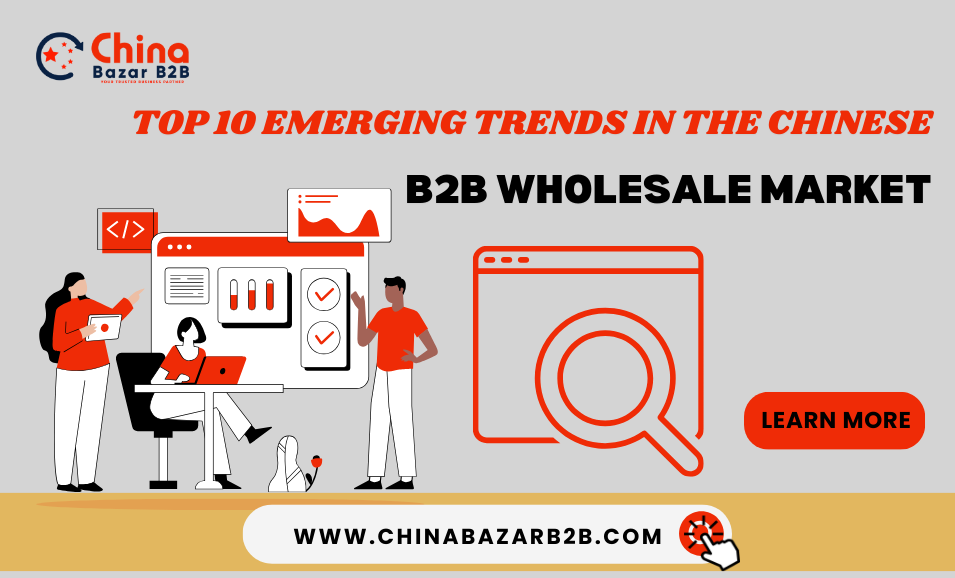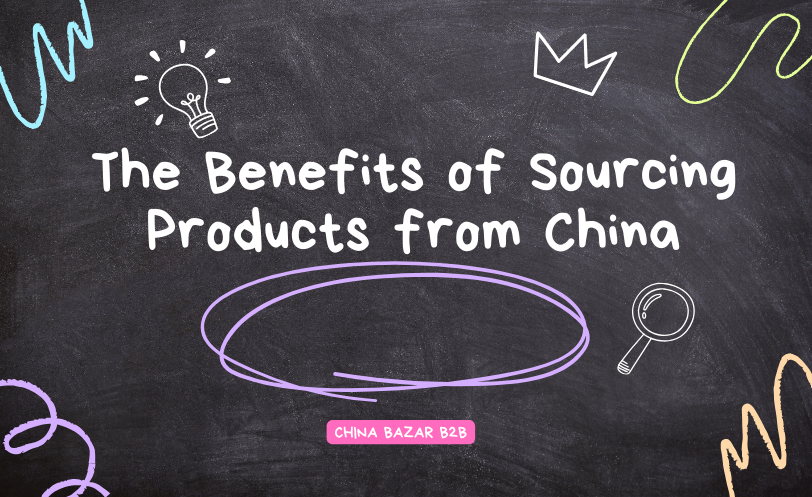
Top 10 Emerging Trends in the Chinese B2B Wholesale Market
The Chinese B2B wholesale market is going through big changes. Because of new technologies, changing customer habits, and changing business strategies. China is a world economic powerhouse. For this reason, companies that want to do well in this fast-paced market need to keep an eye on the new trends in their B2B wholesale sector. In this article, we'll talk about the top 10 new trends in the Chinese B2B wholesale market.
Digitalization and E-commerce Dominance:
Chinese business-to-business (B2B) trade is quickly changing for digitalization. New trends point to e-commerce playing a major role in this. Digital technologies are being increasingly adopted by more Chinese companies, causing a shift from traditional in-store transactions to online transactions. E-commerce, led by big names like Alibaba and JD.com, is quickly becoming the main way that businesses deal with each other. This digitalization makes things easier, saves money, and gives Chinese companies access to a global market. It also lets smaller businesses fight with bigger ones on an even playing field. It makes the B2B ecosystem in China more dynamic and competitive. E-commerce is expected to become even more important in Chinese business-to-business (B2B) as digitalization continues to move forward. This will drastically change how businesses work and interact in this fast-paced market.
AI-Powered Sourcing and Procurement:
AI-driven sourcing and procurement are rapidly changing how Chinese businesses conduct business with each other. New trends in this area show how artificial intelligence can change everything. Businesses are increasingly using AI to simplify the process of selecting suppliers. It improves pricing methods and makes supply chain management better. Companies use predictive analytics and machine learning systems to make decisions based on data. This helps them cut costs and work more efficiently. AI also makes it easier to control risks. And it makes sure that rules are followed. As more Chinese companies embrace these technologies, the future of buying and procurement in the country appears bright. With its supply chains becoming more resilient and companies growing more competitive.
Cross-Border Trade Expansion:
As Chinese business-to-business (B2B) trade expands across borders. It increasingly shifts towards technology and globalization. E-commerce platforms and digital marketplaces are becoming more and more important for foreign trade. Making it easier for companies of all sizes to do. The Belt and Road Initiative is a key part of connecting Chinese companies with partners around the world, which leads to more cooperation between countries. A focus on sustainable and eco-friendly practices is also growing in importance. This is part of a world shift toward responsible and ethical business practices. Those trends are likely to continue to shape China's business-to-business trade for years to come. These trends give companies that do business across borders both chances and problems.
Sustainable and Eco-Friendly Practices:
Sustainable and eco-friendly business methods are becoming more and more common in China. Chinese businesses are innovating new ways to reduce their carbon footprint as environmental responsibility gains more importance. For example, green supply chain management, the use of renewable energy sources, and the support of circular economy models are all things that can help with this. These new trends are helping Chinese companies reach their sustainability goals. They are also making the market more eco-friendly and competitive. It is in line with efforts around the world to fight climate change.
Integration of Blockchain Technology:
In recent years, clear trends have emerged in the utilization of blockchain technology in Chinese B2B (business-to-business) deals. Chinese companies are using blockchain to make the supply chain more open. It makes cross-border trade easier. And it cut down on scams. Smart contracts are an important part of blockchain. These are being used to make business deals more automated and enforceable. It makes complicated processes easier to understand. Also, the Chinese government's push for digitalization and backing for blockchain projects by regulators have sped up their use. Because of this, the ecosystem of blockchain-based business-to-business tools is growing. Making it safer and more efficient for people to do business in China.
Personalization and Customer-Centric Approaches:
Personalization and putting the customer first are two new business-to-business (B2B) trends that are growing quickly in China. China's businesses are increasingly recognizing the importance of customizing their goods and services to meet the unique needs of each customer. This change comes from the desire to build deeper, longer-lasting ties with customers. Which in turn leads to more loyal customers and repeat business. As technology and data analytics improve, Chinese B2B companies are better able to understand what their customers want. Then, give them solutions that fit their needs. This trend is changing how companies work and talk to their customers. In the fast-paced and competitive Chinese market as it continues to grow.
Data-Driven Decision Making:
In the Chinese B2B sector, data-driven decision-making is gaining popularity as new trends reshape the landscape. Chinese companies are using big data analytics. AI-driven insights more and more to help them make smart decisions. One of these trends is the rising use of cloud-based data platforms. It uses predictive analytics algorithms that use machine learning and data strategies that focus on the customer as China's business-to-business market changes. Companies are realizing how important it is to make decisions based on data in order to improve customer experiences. It runs more efficiently and grows in a market that is becoming more competitive.
Mobile Commerce and Remote Work:
In China, mobile shopping and working from home are two new business-to-business (B2B) trends, with more smartphones on the market and better connectivity. Chinese companies are using mobile commerce to make buying and selling things easier while they're on the go. This trend has made deals more efficient, and decision-making go more quickly. Also, working from home has become more popular, especially since the COVID-19 pandemic. Because Chinese businesses see flexibility and cost savings as benefits. There is a change in the standard workplace model because many companies now let their workers work from home. These trends show how China's business world is always changing. Technology and the ability to adapt are very important in deciding how businesses will deal with each other in the future.
Collaborative Supply Chain Networks:
In the Chinese B2B sector, collaborative supply chain networks are undergoing significant changes due to new trends. As China's role in world trade grows, more and more businesses are introducing technology-based solutions. It makes working together easier and faster. The combination of AI, blockchain, and IoT technologies is speeding up the supply chain, making it easier to keep track of goods. It makes things more clear. Sustainability and eco-friendly practices are also becoming more popular. With a focus on lowering carbon loads and making sure products are sourced responsibly. This changing environment shows that China is serious about building new, long-lasting supply chain networks in the fast-paced world of business-to-business (B2B) trade.
Government Regulations and Compliance:
In Chinese B2B, adhering to government rules is increasingly vital as new trends emerge. China's government is strictly implementing stricter rules and standards to protect data. Ensure fair competition and make the business-to-business sector more open. These rules cover a lot of different areas, such as protecting data, fighting corruption, and making sure products meet high standards. Companies that work in this area need to stay alert and flexible. Keeping up with these changing rules is important for long-term success and building trust with customers and partners.
The Chinese B2B wholesale market is changing quickly because of new technologies, shifting customer needs, and a strong focus on being environmentally friendly. Businesses that work in this fast-paced environment need to keep up with these new trends. To stay competitive and take advantage of the world's biggest B2B wholesale market opportunities. Whether through technology, eco-friendly practices, or advanced data analytics, businesses in China will need to adapt to these changes if they intend to succeed in the evolving B2B market.

Understanding Cross-Border Trade: A Guide for B2B Businesses
11 November 2023

The Future of B2B China Trade
08 November 2023

How to Find High-Quality Suppliers in ChinaBazarB2B
07 November 2023

Top 10 Emerging Trends in the Chinese B2B Wholesale Market
06 November 2023

Chinese Market Research Technique
05 November 2023
Related Post


